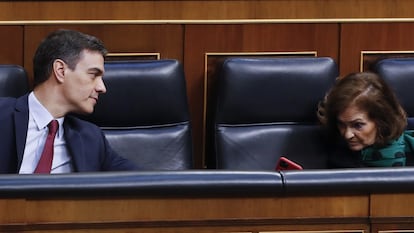Spain passes decree aimed at combatting standstill in justice system due to coronavirus crisis
Minority government secures backing for a plan to streamline procedures after lockdown creates a mounting backlog of cases

Spain’s Congress of Deputies has approved a government decree adapting the justice system to the Covid-19 crisis, which has brought legal activity nearly to a standstill.
The decree introduces new working practices and procedures to keep the judiciary functioning. The need to overhaul Spain’s slow legal system has long been the subject of political debate, but little had been done to date. Now, the coronavirus pandemic has prompted new responses such as video hearings for labor and family court proceedings.
The way out of this is through the unity of all in order to save lives, businesses and jobs.PM Pedro Sánchez
Prime Minister Pedro Sánchez of the Socialist Party (PSOE), who heads a minority government in coalition with junior partner Unidas Podemos, has managed to secure enough congressional support for the decree despite opposition from right-of-center groups such as the Popular Party (PP) and Ciudadanos (Citizens).
Instead, the decree passed on Wednesday with 178 votes in favor, thanks to support from two smaller regional groups, the Basque Nationalist Party (PNV) and the Catalan Republican Left (ERC). This latter party did not support Sánchez’s recent request for a fourth extension to the state of alarm that underpins Spain’s gradual deescalation measures.
The government has also successfully pushed through a second decree containing emergency measures against the effects of the coronavirus crisis on jobs and the economy. Ciudadanos backed this second initiative, which passed with 201 votes in favor, but it did not vote for the justice decree. However, Ciudadanos did support prolonging the government’s emergency powers last week.
Shifting alliances

These shifting political alliances underscore how the Spanish executive is being forced to seek vote-by-vote arrangements to get legislation passed. The majority behind its justice decree has the same composition as the one that confirmed him as the prime minister of Spain following the general election of November 2019.
In a few days, Sánchez will have to return to Congress to seek support for a fifth extension to the state of alarm, which currently ends on May 24. But growing opposition to the government’s prolonged use of emergency powers makes it uncertain whether the move will prosper.
Speaking in Congress on Wednesday, PP leader Pablo Casado criticized Sánchez’s “varying geometry,” alluding to his different alliances, and made renewed demands for lifting confinement measures, handing face masks to all citizens, mass testing, and for replacing the emergency powers with ordinary laws. Casado said that the PP will vote against a new extension to the state of alarm.
Aitor Esteban of the PNV asked Sánchez to clarify what he means by “the new normality,” an expression used by the government to define life after the deescalation process is completed. The Basque politician warned about a possible loss of rights and freedoms under the current state of alarm.
Sánchez replied with a message that he reiterated throughout the session: “The way out of this is through the unity of all in order to save lives, businesses and jobs.”
Summer vacation
Part of the reason why Ciudadanos did not support the justice decree, said party sources, is the government’s insistence on holding trials during much of the month of August, when courts are traditionally closed. “You have expropriated the vacation time of lawyers and expert witnesses,” said Edmundo Bal, the party’s spokesperson for justice affairs, addressing Justice Minister Juan Carlos Campo at a meeting of the congressional Justice Committee last week.
The decree stipulates that legal activity may take place between August 11 and 31, in a bid to make up for two months of lockdown. Under confinement, judicial offices have only performed 20% of the work they would normally do, said the justice minister in Congress. That means that in the coming months, the system will have to deal with new matters as well as with the remaining 80% of outstanding work.
And experts warn about a rise in litigation as a result of the coronavirus crisis. According to Justice Ministry figures, bankruptcy proceedings will increase 246% this year and 619% in 2021. “The collapse of the justice system could take place once the state of alarm is lifted,” warned Campo ahead of the vote. “Not supporting this decree could have dramatic consequences.”
The minister said that the contents of the decree have been negotiated with regional governments – even those run by the PP – and with the General Council of the Judiciary watchdog, prosecutors and bar associations.
English version by Susana Urra.
Tu suscripción se está usando en otro dispositivo
¿Quieres añadir otro usuario a tu suscripción?
Si continúas leyendo en este dispositivo, no se podrá leer en el otro.
FlechaTu suscripción se está usando en otro dispositivo y solo puedes acceder a EL PAÍS desde un dispositivo a la vez.
Si quieres compartir tu cuenta, cambia tu suscripción a la modalidad Premium, así podrás añadir otro usuario. Cada uno accederá con su propia cuenta de email, lo que os permitirá personalizar vuestra experiencia en EL PAÍS.
¿Tienes una suscripción de empresa? Accede aquí para contratar más cuentas.
En el caso de no saber quién está usando tu cuenta, te recomendamos cambiar tu contraseña aquí.
Si decides continuar compartiendo tu cuenta, este mensaje se mostrará en tu dispositivo y en el de la otra persona que está usando tu cuenta de forma indefinida, afectando a tu experiencia de lectura. Puedes consultar aquí los términos y condiciones de la suscripción digital.








































